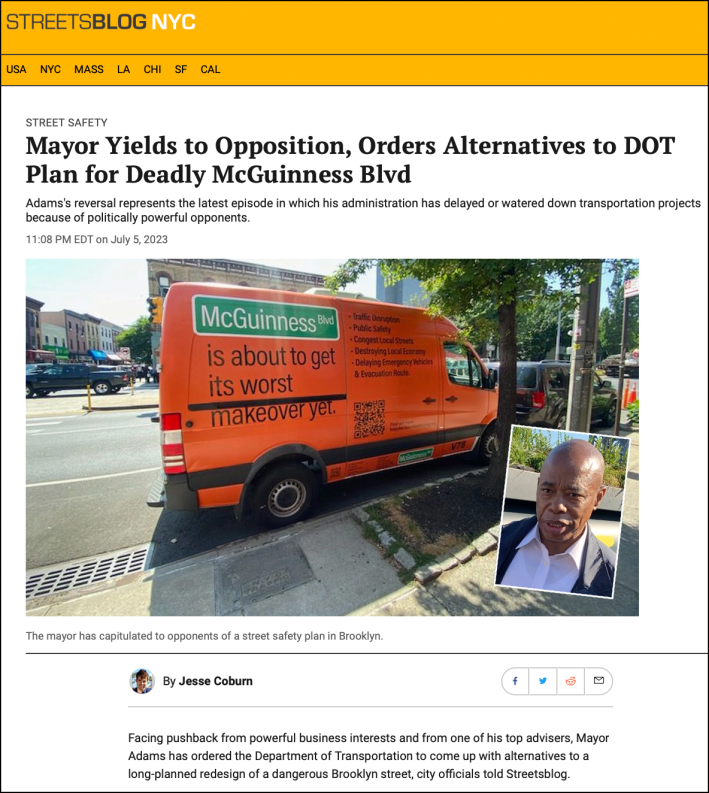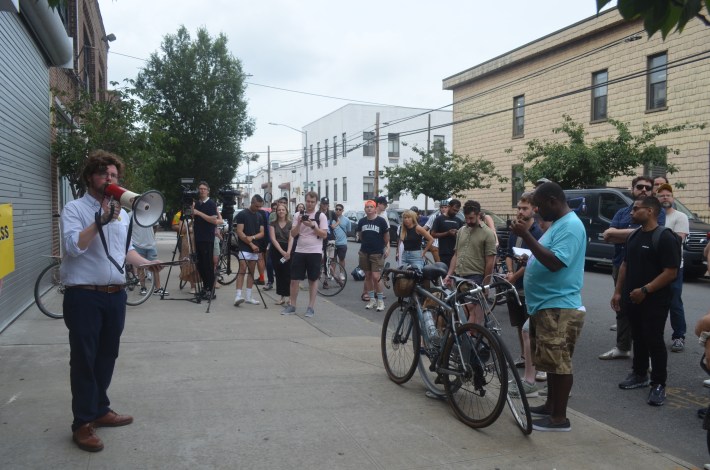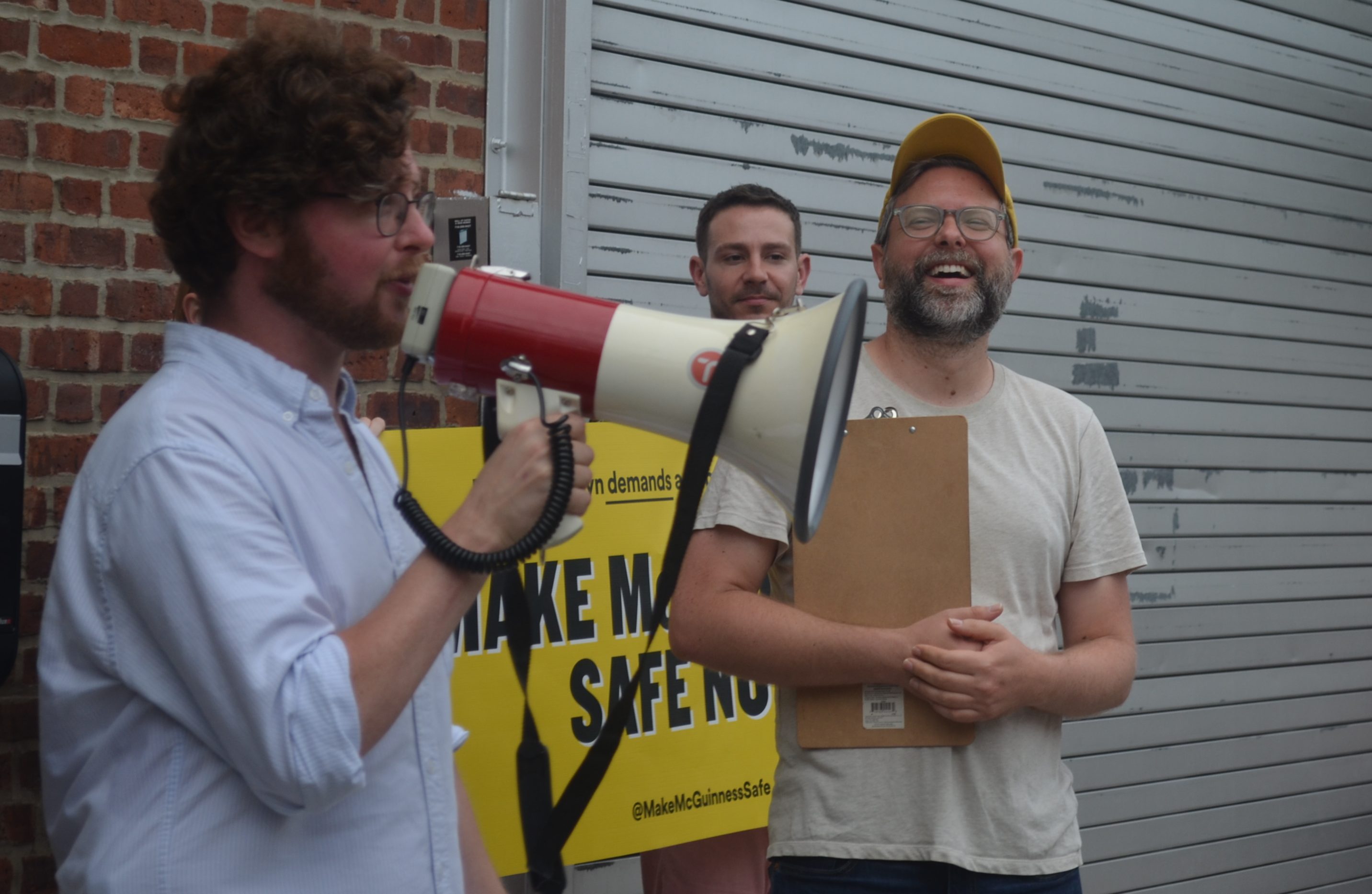Residents of Greenpoint rallied on Friday to slam Mayor Adams for backtracking on a safety redesign of deadly McGuinness Boulevard — a plan that he already approved, but then discarded after a well-funded campaign by the politically connected Argento family.

The rally, in front of a facility owned by the Argento, was hastily organized by the pro-redesign group, Make McGuiness Safe after the mayor ordered the Department of Transportation to shelve its popular plan and go back to the drawing board.
"The mayor got it wrong,” said Nina Cinelli, a Greenpoint resident and a parent at PS 110, where teacher Matthew Jensen taught before he was killed by a hit-and-run driver on McGuinness in May 2021 — an event that galvanized support for making McGuinness safer and led to then-Mayor Bill de Blasio to allocate $40 million towards the effort.
Even with such short notice, close to 100 people attended the "community speakout" to protest the power of the Argento family, whose Broadway Stages has given hundreds of thousands of dollars to local politicians, including the mayor and the Brooklyn Democratic Party. The opposition from a powerful local business encouraged the mayor to revisit the plan this week, with chief aide Ingrid Lewis-Martin falsely telling him that the plan was not popular with local residents, according to accounts in both Streetsblog and The City.
Last night McGuinness Blvd rally to support the @NYC_DOT safety redesign torpedoed by @NYCMayor
— Streetfilms (1,072+ videos!) (@Streetfilms) July 8, 2023
With @keviningreenpt @NBk_TA @EmilyAssembly @jonorcutt @CMJenGutierrez & more! @NYCMayor @StreetsblogNYC @TransAlt @OpenPlans @LincolnRestler @KathyParkPrice pic.twitter.com/FMLrL5WLON
“The plan is in danger because of corporate interests in this neighborhood that are prioritizing profits over our safety.” said Kevin LaCherra, a fourth-generation Greenpoint resident, who was physically harassed last month by an opponent of the redesign. "We are here tonight to tell the mayor that Greenpoint needs him to make good on his promise and to implement his plan to make McGuinness safe. That is what we want, is what we need.”

LaCherra's family knows the problems with McGuinness firsthand; his great-grandmother's house was demolished when then-Oakland Street was widened after the opening of the Pulaski Bridge. The boulevard not only splits the community up but serves as a shortcut between the Long Island and the Brooklyn-Queens expressways that saves drivers only 90 seconds yet befouls the largely residential area, LaCherra added.
Dozens of people rallied in Greenpoint Friday in support of a plan to redesign McGuinness Boulevard, where three people have been killed in traffic accidents since 2012 and hundreds more have been injured. https://t.co/Dhjvbf1hxo
— WNYC 🎙 (@WNYC) July 8, 2023
Speaker after speaker emotionally begged the mayor to realize that residents of the neighborhood support the plan, despite what Lewis-Martin told Hizzoner.
“It's particularly hurtful when they throw out this entire plan because someone in Eric Adams' administration tells them, ‘Forget all of the organizing, forget what your professionals have told you, forget what the people who have engineering degrees have done,'" said Cole Kennedy, who lives on McGuinness. "Someone just whispers in your ear and says, ‘No, it's all outsiders’ — and it's not true. We're here."
Safety, of course, was on most speakers' minds.
"Four hundred kids that go to PS 34 on McGuinness and cross that street on a daily basis are at risk" because of the high speeds and crashes on the roadway, added Lisa Jaycox.
In just the last 10 years along the 15 blocks of McGuinness between the Brooklyn-Queens Expressway and the Pulaski Bridge, there have been 1,698 reported crashes, according to NYPD stats, injuring 387 people and killing three, or roughly 39 injuries per year. And the DOT told Community Board 1 that in just the five years between 2016 and 2020, 230 people were injured, 13 severely. That's roughly 46 injuries per year.
In just the last 10 years along the 15 blocks of McGuinness between the Brooklyn-Queens Expressway and the Pulaski Bridge, there have been 1,698 reported crashes, according to NYPD stats, injuring 387 people and killing three, or roughly 39 injuries per year. And, according to the DOT, in just the five years between 2016 and 2020, 230 people were injured, 13 severely. That's roughly 46 injuries per year.
McGuinness is not only the Grand Canyon of Greenpoint, it's also scary for pedestrians and families with kids. Between July 1, 2020 and June 30, 2021, for example, the two speed cameras on McGuinness caught 7,554 drivers for exceeding the 25 mile-per-hour speed limit by at least 11 miles per hour.
That's about 30 speeding tickets for every half-day, Streetsblog reported.
In the two years since Jensen's death, the DOT held three town hall meetings and conducted outreach to dozens of businesses and hundreds of residents. In addition, Make McGuiness Safe collected 6,500 signatures on petitions supporting the safety improvements — more than 75 percent of which were from residents of the neighborhood. And 33 percent of signers live within 1,200 feet of McGuinness.
The redesign has also been supported by Brooklyn Borough President Antonio Reynoso, Comptroller Brad Lander, state Sen. Kristen Gonzalez, who spoke at the rally, Council Members Jennifer Gutierrez and Lincoln Restler, U.S. Rep. Nydia Velasquez, and Public Advocate Jumaane Williams.
But Broadway Stages opposes it on the grounds that narrowing McGuinness will create more traffic that will slow down their trucks, the DOT officials have said that "road diet" designs do not slow down traffic.
City Hall spokesman Charles Lutvak said that the DOT is refining its final design based on community feedback and denied the mayor was persuaded by political pressure. "All decisions are based on the merits of any issue," he said.
Make McGuinness Safe will rally again on Thursday, July 13 at 6 p.m. at City Hall.






